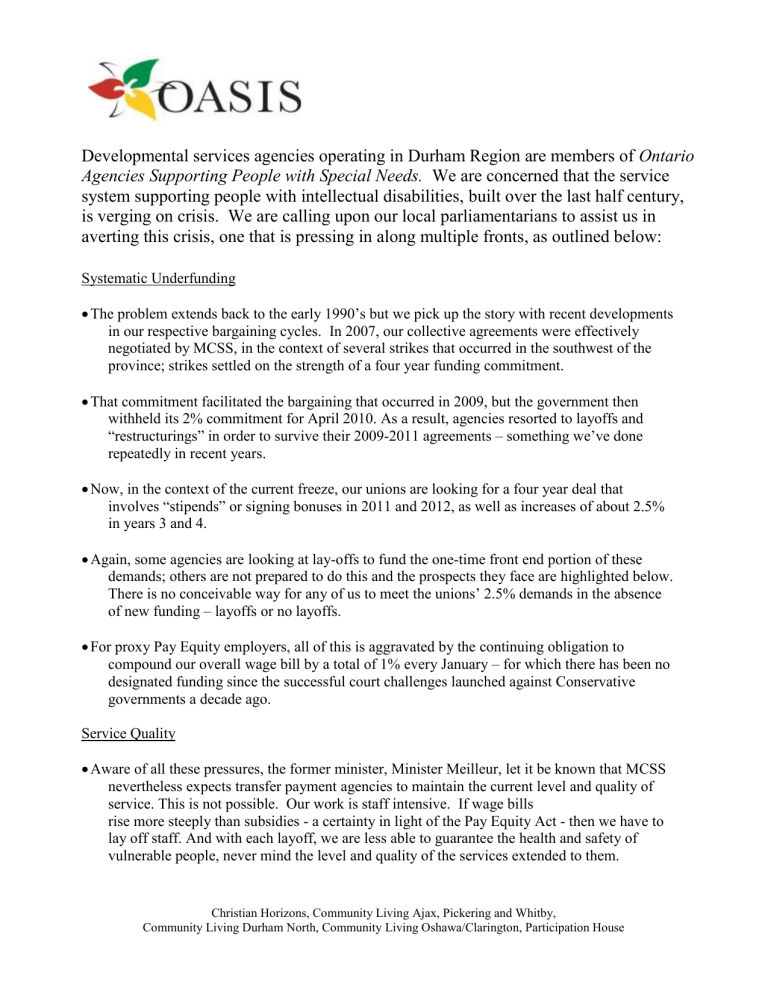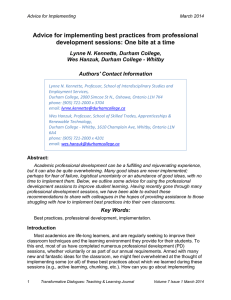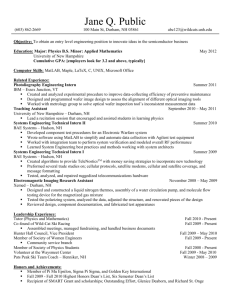Developmental services agencies operating in Durham Region are

Developmental services agencies operating in Durham Region are members of Ontario
Agencies Supporting People with Special Needs. We are concerned that the service system supporting people with intellectual disabilities, built over the last half century, is verging on crisis. We are calling upon our local parliamentarians to assist us in averting this crisis, one that is pressing in along multiple fronts, as outlined below:
Systematic Underfunding
The problem extends back to the early 1990’s but we pick up the story with recent developments in our respective bargaining cycles. In 2007, our collective agreements were effectively negotiated by MCSS, in the context of several strikes that occurred in the southwest of the province; strikes settled on the strength of a four year funding commitment.
That commitment facilitated the bargaining that occurred in 2009, but the government then withheld its 2% commitment for April 2010. As a result, agencies resorted to layoffs and
“restructurings” in order to survive their 2009-2011 agreements – something we’ve done repeatedly in recent years.
Now, in the context of the current freeze, our unions are looking for a four year deal that involves “stipends” or signing bonuses in 2011 and 2012, as well as increases of about 2.5% in years 3 and 4.
Again, some agencies are looking at lay-offs to fund the one-time front end portion of these demands; others are not prepared to do this and the prospects they face are highlighted below.
There is no conceivable way for any of us to meet the unions’ 2.5% demands in the absence of new funding – layoffs or no layoffs.
For proxy Pay Equity employers, all of this is aggravated by the continuing obligation to compound our overall wage bill by a total of 1% every January – for which there has been no designated funding since the successful court challenges launched against Conservative governments a decade ago.
Service Quality
Aware of all these pressures, the former minister, Minister Meilleur, let it be known that MCSS nevertheless expects transfer payment agencies to maintain the current level and quality of service. This is not possible. Our work is staff intensive. If wage bills rise more steeply than subsidies - a certainty in light of the Pay Equity Act - then we have to lay off staff. And with each layoff, we are less able to guarantee the health and safety of vulnerable people, never mind the level and quality of the services extended to them.
Christian Horizons, Community Living Ajax, Pickering and Whitby,
Community Living Durham North, Community Living Oshawa/Clarington, Participation House
Wait Lists
If existing services are compromised, what does that say to people waiting outside the gates?
Province wide, wait lists for residential supports have risen to 12,000 people in a sector that currently provides this kind of support to just 16,000. In Durham, the residential wait list now tops 500 people. Many elderly parents are among those who are waiting. And, increasingly,
LTC facilities are the default solution regardless of the person’s age. Ontario rightly celebrates the fact that we have closed the last of the large segregated facilities; it is a travesty that we are beginning to populate LTC facilities with people in their thirties and forties.
The situation is almost as grave when one looks at non-residential service options. There is simply no mechanism whatsoever to ensure that young people graduating from school will have any alternative to getting onto a wait list and sitting at home.
The Impact of Labour Unrest in the DS Sector
Our sector is not covered by essential service legislation. And the total number of our management and non-unionized administrative staff is barely equal to the number of our different residential locations – which, of course, operate 24 hours a day, 7 days per week. So, in a strike or lock-out, we would need to import replacement workers from elsewhere in the province, or from points further afield.
In 2007, with work stoppages at six or seven different agencies, the strike management firms involved were unable to meet the full demand for replacement workers. In the event of more generalized labour unrest, the supply of workers would lag critically behind and group homes would become absolutely unsafe.
A single CUPE local has organized four different Durham agencies and it is by no means certain that replacement workers could be found to satisfy our needs in the event of a coordinated local action.
Picketing of Group Homes
This issue is another reason why responsible agencies are contemplating grave trade-offs in order to reach settlements. In the summer of 2007, in southwestern Ontario, a number of supported living residences were caught up in a labour dispute that continued for nine weeks. Homes were subjected to picketing and supported people felt trapped inside them or were forced to leave altogether. Many residential neighbourhoods were disrupted by picket lines, portable bathrooms, megaphones, and whistles. In some locations, this occurred at all hours of the day and night.
Sylvia Jones’ private member’s bill did not succeed and we can expect more of the same in the event that settlements cannot be achieved.
Christian Horizons, Community Living Ajax, Pickering and Whitby,
Community Living Durham North, Community Living Oshawa/Clarington, Participation House











